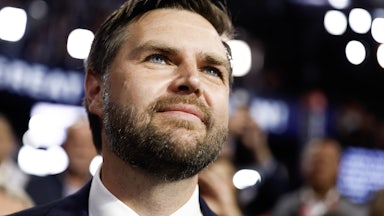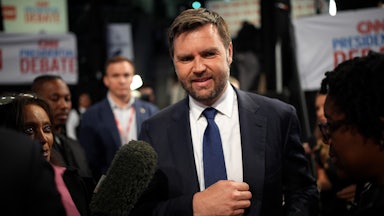The cover photo of Hillbilly Elegy, the book that made J.D. Vance rich and famous and may ultimately carry him to the White House, shows a run-down barn on a dirt road, a faded American flag painted on the side. The rolling hills in the background suggest the scene is somewhere in Appalachia. But while Vance’s family comes from Jackson, Kentucky, he grew up 200 miles away in Middletown, Ohio, a city of 50,000 located between Cincinnati and Dayton. If that complicates his image as the man who can explain Appalachia and its culture to the rest of America, it didn’t slow his rise.
Vance’s persona as the tribune of the white working class may not be the most important reason Donald Trump picked him to join the Republican ticket in this election, but it is the essence of what Vance represents. Although many commentators have chronicled Vance’s journey from harsh Trump critic to worshipful Trump hype man, Vance’s more important transformation on the white working class has attracted far less notice.
Hillbilly Elegy became such a huge hit mostly because of its fortuitous timing, coming out in 2016 just as the country was puzzling over how a real estate mogul from New York could inspire such fervent devotion among working-class whites, particularly those in rural areas. If any liberals were looking for reassurance that the struggles of rural America were the fault of the people who live there, Vance obliged. His book may be written with love, but it’s also unsparing to the point of harshness. The people he describes have reacted “to bad circumstances in the worst way possible,” in “a culture that increasingly encourages social decay instead of counteracting it.” He tells stories of violence, irresponsibility, laziness, and “a willingness to blame everyone but yourself.” As he put it in a 2016 article in The Atlantic, the “wolves” stalking downscale whites were “not coming in from Mexico, not prowling the halls of power in Washington or Wall Street—but here in ordinary American communities and families and homes.”
It’s not a surprise that many Appalachians took issue with this portrayal, which they found condescending or worse. Nor is it an accident that someone with this message—that poor people should stop complaining and pull themselves up by their own bootstraps without looking to government—would appeal to Peter Thiel, the right-wing tech billionaire who became Vance’s boss in a venture capital firm and then his political patron. By the spring of 2022, Thiel had given $15 million to help elect Vance to the Senate.
In that race, Vance discarded his tough-love stance toward the heartland in favor of a different story, this time blaming those very “halls of power in Washington and Wall Street.” His campaign leaned heavily on fear of immigrants, resentment of elites, and the “great replacement” theory. As he said in one TV ad, “The media calls us racist for wanting to build Trump’s wall. They censor us, but it doesn’t change the truth. Joe Biden’s open border is killing Ohioans, with more illegal drugs and more Democrat voters pouring into this country.” This reflected a remarkable degree of cynicism, since Vance knows full well that the opioid crisis has its roots not in Mexico but in American pharmaceutical companies; in fact, Vance worked for a white-shoe law firm whose clients included Purdue Pharma, the disgraced manufacturer of Oxycontin. The venture capitalist who left the state to pursue his fortune in Silicon Valley had reinvented himself once again as a Trump-style populist stoking white resentment—one might say, encouraging voters to “blame everyone but yourself.”
That change has hardly gone unnoticed among rural people. “Peter Thiel has spent millions of dollars convincing the American media that J.D. Vance has something to say about rural America,” Matthew Hildreth, the executive director of RuralOrganizing.org, told us. “But rural Americans don’t need J.D. Vance to write our elegy, we need politicians who will stand up to corporations like Purdue Pharma who are exploiting our communities every chance they get.”
To be fair, Vance has undertaken some legitimately populist efforts in the Senate, including joining with Elizabeth Warren on bills that would target the executives of big banks when they fail. But his critique of corporate America is selective, to put it mildly. In fact, Vance is a leading light of the “new right,” a group of conservative politicians and intellectuals who believe we are in the midst of a civilizational collapse and the answer is for conservatives to reject their prior belief in small government as they mount a comprehensive assault—wielding the power of government—on all the major institutions of public life. Vance has expressed admiration for the way Hungarian Prime Minister Viktor Orbán seized control of state universities, for example, which Vance believes is the appropriate way to undo left-wing influence there.
At a basic level, the new right is proposing not to eliminate elite control of institutions but to replace the current elite with a new one, much as Trump’s project to “drain the swamp” actually means simply replacing one class of Washington insiders with another, more corrupt one. If the Trump-Vance government takes over America’s universities like Orbán did, they won’t be holding national plebiscites to decide what books history majors will have to read. Some group of government elites will do it. Perhaps with Vance’s supervision.
Vance’s movement from Trump critic to Trump fanboy has drawn a great deal of attention. One might surmise that part of the reason Trump picked him is because breaking a critic like Vance reinforces Trump’s need for dominance: Sooner or later, every Republican who questions him must bend the knee. Vance, of course, first did so to win a highly contested GOP primary for Ohio’s open Senate seat. “J.D. is kissing my ass, he wants my support,” Trump crowed at the time, comparing Vance’s pandering to the way North Korean dictator Kim Jong Un “fell in love” with him.
But Vance’s less straightforward evolution, on the working class, is far more consequential. In his book he blamed Appalachians themselves for their problems; now he blames the “elite.” But he is less critical of the brutal forces of capitalism that have done so much harm to rural America. He may want more restrictive trade policies (and much more restrictive immigration policies), but what really burns him up about corporations—and every other institution—is when they get too “woke.” The answer to that problem, he believes, isn’t to give power to the people. It’s to give power to people like J.D. Vance.








